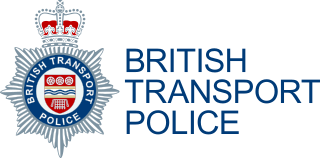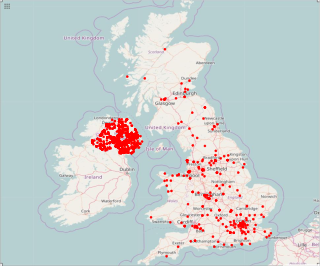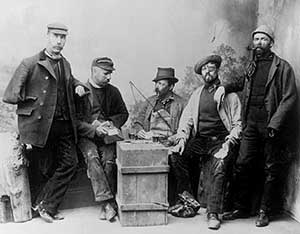
The Metropolitan Police Service (MPS), also officially known as the Metropolitan Police, which is still its common name, serves as the territorial police force responsible for law enforcement and crime prevention within the ceremonial county of Greater London. In addition, it is responsible for specialised tasks throughout the United Kingdom, such as UK counter-terrorism measures, and the protection of certain individuals, including the monarch, royal family, governmental officials, and other designated figures. Commonly referred to as the Met, it is also referred to as Scotland Yard or the Yard, after the location of its original headquarters in Great Scotland Yard, Whitehall in the 19th century. Its present headquarters are near there at New Scotland Yard on the Victoria Embankment.

British Transport Police is a national special police force that polices the railway network of England, Wales and Scotland. The force polices more than 10,000 miles of track and more than 3,000 stations and depots.

The Commissioner of Police of the Metropolis is the head of London's Metropolitan Police Service. Sir Mark Rowley was appointed to the post on 8 July 2022 after Dame Cressida Dick announced her resignation in February 2022.
The Association of Chief Police Officers of England, Wales and Northern Ireland (ACPO) was a not-for-profit private limited company that for many years led the development of policing practices in England, Wales, and Northern Ireland. Established in 1948, ACPO provided a forum for chief police officers to share ideas and coordinate their strategic operational responses, and advised government in matters such as terrorist attacks and civil emergencies. ACPO coordinated national police operations, major investigations, cross-border policing, and joint law enforcement. ACPO designated Senior Investigative Officers for major investigations and appointed officers to head ACPO units specialising in various areas of policing and crime reduction.
The Specialist Operations directorate is a unit of the Metropolitan Police in London, England. It is responsible for providing specialist policing capabilities, including national security and counter-terrorism operations. The Specialist Operations directorate is currently led by Assistant Commissioner Matt Jukes.
The Territorial Support Group (TSG) is a Met Operations unit of London's Metropolitan Police Service (MPS) which specialises in public order policing, amongst other specialist areas. In 2012 it consisted of 793 officers and 29 support staff. The TSG is a uniformed unit of the MPS that replaced the similarly constituted Special Patrol Group in 1987. TSG units patrol the streets of London in marked police vans or "carriers"; using the call sign prefix "Uniform". Generally each carrier has an advanced (police) driver, seven constables, and a sergeant. Territorial Support Groups often comprise three carriers, twenty one constables, and three sergeants reporting to an Inspector. They separately patrol designated areas experiencing serious levels of gang violence or disorder. When deployed, it is by the MPS Information Room. Due to the public order nature of their role, numerous carriers will often be assigned. TSG officers can be identified as TSG from the distinctive "U" in their shoulder numbers. Some TSG officers are also plainclothes officers, carrying a taser and handcuffs.

The Directorate General of Forces Intelligence, commonly known by its acronym DGFI, is the defense intelligence agency of the Bangladesh Armed Forces, tasked with collection, collation and evaluation of strategic and topographic information, primarily through human intelligence (HUMINT). As one of the principal members of the Bangladesh intelligence community, the DGFI reports to the Director-General under the executive authority of the head of government, the Prime Minister, and is primarily focused on providing intelligence for the Prime Minister, the Cabinet of Bangladesh, and the Armed Forces of Bangladesh.
Counter Terrorism Command (CTC) or SO15 is a Specialist Operations branch within London's Metropolitan Police Service. The Counter Terrorism Command was established as a result of the merging of the Anti-Terrorist Branch (SO13) and Special Branch (SO12) in October 2006, bringing together intelligence, operations, and investigative functions to form a single command. CTC has over 1,500 police officers and staff, and a number of investigators based overseas and also hosts the Counter Terrorism Policing headquarters.
Terrorism in Australia deals with terrorist acts in Australia as well as steps taken by the Australian government to counter the threat of terrorism. In 2004 the Australian government has identified transnational terrorism as also a threat to Australia and to Australian citizens overseas. Australia has experienced acts of modern terrorism since the 1960s, while the federal parliament, since the 1970s, has enacted legislation seeking to target terrorism.

Terrorism in the United Kingdom, according to the Home Office, poses a significant threat to the state. There have been various causes of terrorism in the UK. Before the 2000s, most attacks were linked to the Northern Ireland conflict. In the late 20th century there were also attacks by Islamic terrorist groups. Since 1970, there have been at least 3,395 terrorist-related deaths in the UK, the highest in western Europe. The vast majority of the deaths were linked to the Northern Ireland conflict and happened in Northern Ireland. In mainland Great Britain, there were 430 terrorist-related deaths between 1971 and 2001. Of these, 125 deaths were linked to the Northern Ireland conflict, and 305 deaths were linked to other causes, including 270 in the Lockerbie bombing. Since 2001, there have been almost 100 terrorist-related deaths in Great Britain.
Peter John Michael Clarke, CVO, OBE, QPM is a retired senior police officer with London's Metropolitan Police most notably having served as a Deputy Assistant Commissioner with the Specialist Operations directorate, commanding the Counter Terrorism Command.

The National Crime Agency (NCA) is a national law enforcement agency in the United Kingdom. It is the UK's lead agency against organised crime; human, weapon and drug trafficking; cybercrime; and economic crime that goes across regional and international borders, but it can be tasked to investigate any crime. The NCA has a strategic role as part of which it looks at serious crime in aggregate across the UK, especially analysing how organised criminals are operating and how they can be disrupted. To do this, it works closely with regional organised crime units (ROCUs), local police forces, and other government departments and agencies.

Sir Mark Peter Rowley is a British senior police officer who has been the Commissioner of Police of the Metropolis since September 2022.

Dame Lynne Gillian Owens, is a senior law enforcement officer in the United Kingdom. She was made interim Deputy Commissioner of the Metropolitan Police Service in September 2022 before being confirmed as that role's permanent holder in February 2023, the first-ever such female holder.
The National Police Chiefs' Council (NPCC) is a national coordination body for law enforcement in the United Kingdom and the representative body for senior police officers in the United Kingdom. Established on 1 April 2015, it replaced the former Association of Chief Police Officers (ACPO), following the Parker Review of the operations of ACPO.

On 22 March 2017, a terrorist attack took place outside the Palace of Westminster in London, seat of the British Parliament. Khalid Masood, a 52-year-old Briton, drove a car into pedestrians on the pavement along the south side of Westminster Bridge and Bridge Street, injuring more than 50 people, four of them fatally. He then crashed the car into the perimeter fence of the palace grounds and ran into New Palace Yard, where he fatally stabbed an unarmed police officer. He was then shot by an armed police officer, and died at the scene.

Counter Terrorism Policing is the national collaboration of police forces working to prevent, deter, and investigate terrorism in the United Kingdom.
The Department of Home Affairs is the Australian Government interior ministry with responsibilities for national security, law enforcement, emergency management, border control, immigration, refugees, citizenship, transport security and multicultural affairs. The portfolio also includes federal agencies such as the Australian Border Force and the Australian Security Intelligence Organisation. The Home Affairs portfolio reports to the Minister for Home Affairs, currently held by Clare O'Neil, and was led by the Secretary of the Department of Home Affairs, Mike Pezzullo, until his sacking in November 2023 for breaching the code of conduct. In 2022, the Australian Federal Police, Australian Criminal Intelligence Commission and Australian Transaction and Analysis Center were de-merged from the department and moved to the Attorney General portfolio.
Helen Ball is a retired senior British police officer. During part of her final year in policing she served as Acting Deputy Commissioner of the Metropolitan Police Service. At a national level she has been senior coordinator for counter terrorism policing (2013–2016) and strategic leadership advisor to the College of Policing.

Special Branch was a unit in the Metropolitan Police in London, formed as a counter-terrorism unit in 1883 and merged with another unit to form Counter Terrorism Command (SO15) in 2006. It maintained contact with the Security Service (MI5) and had responsibility for, among other things, personal protection of (non-royal) VIPs and performing the role of examining officer at designated ports and airports, as prescribed by the Terrorism Act 2000.











